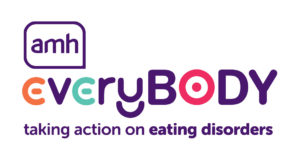
Q1 – Firstly what was it that led to you coming in contact with ourselves at AMH everyBODY?
I had been receiving support from the Well Mind hub in relation to anxiety but then started to open up about how my relationship with food was starting to make things difficult for me in day to day life. It was the first time I was asked about my bingeing and purging, which was something I’d kept a secret for about 2 years. I sort of thought it was something I could just stop at any point, but then it turned from something I did every so often, to every week, to every day and then it didn’t feel like a choice anymore.
The referral was made really quickly as my sessions were ending soon with the Well Mind hub and then I met with yourselves the week after my last session.
Q2 – How did an Eating Disorder have an impact in your life?
It controlled everything. I started to completely cut myself off from all my friends and even people closest to me. My moods were all over the show. One minute I would feel really emotional and the next I would feel so irritable and just snap at my parents for no reason. It was like Jekkyl and Hyde. I was a nightmare to be around and the hardest thing was my head just felt overwhelmed all of the time. I just felt like simple things were impossible to do and I had self-doubts about everything. On top of that I had no energy, I was either over sleeping or not sleeping at all. Everything seemed to be in the extremes, it seemed like there was no balance in my life at all.
Q3 – How did receiving support through AMH everyBODY impact you?
I have to admit I was a bit hesitant at first and part of me didn’t feel ready to let go of my eating disorder, but from the very first meeting I felt like I was listened to and not judged. I felt like I could finally be open about how I had been feeling and it was honestly such a massive weight off my shoulders. Also knowing that my family were also getting support to find out more about what eating disorders were really improved things while I was living at home, it brought us a lot closer together.
I guess I learnt a lot about myself and that there was a lot in my life I did have a choice around, sometimes my eating disorder made me feel like I had no other choice. The support helped me find me again.
Q4 – Six months on from receiving support how is life different for you now?
I’ve had the confidence to get a job and start to connect socially again. There’s a lot of things in life now that I actually look forward to and can get excited about. Yes I still have days I struggle, but even on the bad days I know now what I can try to do to cope in a healthier way. I have a lot more head space. I used to put myself under so much pressure to have things perfect and now I know perfection is a lie. I’ve also been able to move out and live on my own again, I feel like I’ve got my freedom back, both physically and in my head. Life feels a lot more balanced and manageable.

Q5- What did you learn on your journey of Recovery?
That under my eating disorder I was actually a pretty great person with a lot to give to the world. That I was deserving of the same kindness I tried to show others, and that putting myself first sometimes wasn’t selfish. I was so used to believing that my needs were less than others that I was just used to doing without, I started to discover that it felt good to start to do things that sparked a bit of joy, or fun or comfort!
I also learnt that food was never the enemy, it was just a way for me to cope with uncomfortable feelings, to not have to feel them. I learnt new ways to cope like grounding tools, deep breathing and doing things off my comfort list that meant I didn’t have to control food to cope with my emotions.
Most importantly I learnt to reach out and communicate when I did feel like I was starting to struggle, because not every day is going to be a good day and some days we need more help than others and that’s ok.
Q6 – What advice would you give to anyone who is concerned they are struggling with an Eating Disorder?
Don’t feel ashamed of what you are going through! So many more people go through this than are willing to talk about it. A lot of times we only see severe cases in the media or on television. A lot of the time, that’s the problem. Some people can’t identify with the serious cases of eating disorders they see on TV and they don’t get help as a result. Eating disorders don’t have a face. They affect so many different kinds of people from all walks of life. Many times, eating disorders are happening right in front of us. No one should feel afraid to reach out for help.
Q7 – Is there anything you found to be helpful for how people could support someone living with an eating disorder? For example with your family and friends?
This was one of the hardest things for me, because although my family meant well a lot of the time the way we communicated at the beginning of my recovery resulted in explosive arguments. Try not to walk on eggshells around the person, you may feel like you’re afraid of saying the wrong thing but by saying nothing and walking on eggshells the person can feel an atmosphere and it can feel like it’s their fault and another thing for them to feel ashamed about. They might feel they are being treated differently because of their eating disorder. Direct and open communication is always best…even if the person might fight against it in the beginning (I know I did!) sitting down and just saying “Look we want to talk about this because we’re concerned and we love you, but we’ve noticed that…” it takes the shame away when you talk about things that the eating disorder is trying so hard to keep hidden. One of the most helpful things my parents did after getting some support for themselves through the AMH everyBODY support group and by going on the FightED Maudsley course, was to ask me how it feels to have an eating disorder, and ask me what they can do to make things easier. Sometimes it was as simple as I needed them to sit with me after a meal, not talking but just watching tv as a distraction until I felt I could cope to go about my day again. Supporting someone doesn’t always mean talking or having to fix things for them, sometimes it’s just about being there.
Q8 – Would you feel comfortable accessing support in the future if you felt you needed to?
Yes I know now it’s absolutely essential to get support, it’s not something you can fight alone, or should you have to.